12 citations,
August 2016 in “Biomedical Chromatography” A new method accurately measures clobetasol propionate in hair and skin.
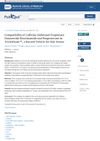
TrichoFoam™ is a stable option for personalized hair loss treatment with most ingredients remaining effective for 90-180 days.
 November 2023 in “Journal of medical and health studies”
November 2023 in “Journal of medical and health studies” Combining low-level laser therapy with scalp microneedling and a clobetasol solution significantly improves androgenetic alopecia.
[object Object] 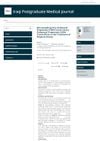 April 2023 in “Iraqi postgraduate medical journal”
April 2023 in “Iraqi postgraduate medical journal” Microneedling with clobetasol cream works better for hair regrowth in alopecia areata than clobetasol cream alone.
 January 2023 in “Indian Dermatology Online Journal”
January 2023 in “Indian Dermatology Online Journal” Bimatoprost and clobetasol are both effective for scalp hair loss, but bimatoprost works faster, has fewer side effects, and grows more colored hair.
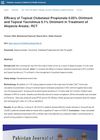 June 2022 in “Pakistan Journal of Medical and Health Sciences”
June 2022 in “Pakistan Journal of Medical and Health Sciences” Topical clobetasol propionate 0.05% ointment is more effective in promoting hair regrowth in patients with alopecia areata than topical tacrolimus 0.1% ointment.
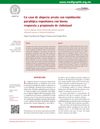 February 2017 in “Medicina cutánea ibero-latino-americana”
February 2017 in “Medicina cutánea ibero-latino-americana” An 8-year-old boy with hair loss had hair regrowth and responded well to clobetasol propionate treatment.
 69 citations,
December 2015 in “Journal of Controlled Release”
69 citations,
December 2015 in “Journal of Controlled Release” Nanocapsules can improve clobetasol delivery to hair follicles, reducing side effects.
 32 citations,
January 2005 in “Journal of The American Academy of Dermatology”
32 citations,
January 2005 in “Journal of The American Academy of Dermatology” Some babies are born with alopecia areata, and a treatment with clobetasol propionate can regrow hair in half of the cases.
 21 citations,
March 2015 in “Journal of The American Academy of Dermatology”
21 citations,
March 2015 in “Journal of The American Academy of Dermatology” Vemurafenib therapy can cause hair loss, but clobetasol propionate foam can help regrow hair.
 July 2022 in “المجلة العراقية للصيدلة”
July 2022 in “المجلة العراقية للصيدلة” Azelaic acid 20% cream works well for treating scalp alopecia areata and can be an alternative to clobetasol ointment.
 53 citations,
February 2017 in “Journal of The American Academy of Dermatology”
53 citations,
February 2017 in “Journal of The American Academy of Dermatology” The conclusion is that high-potency steroids or tacrolimus are effective treatments for erosive pustular dermatosis of the scalp.
28 citations,
July 2015 in “Dermatologic therapy” The combined therapy was effective and safe for children with severe alopecia areata.
21 citations,
May 2017 in “Paediatric drugs” Individualized treatment plans are crucial for children with alopecia areata, with promising options like JAK inhibitors showing significant hair regrowth.
 13 citations,
November 2012 in “Journal of The European Academy of Dermatology and Venereology”
13 citations,
November 2012 in “Journal of The European Academy of Dermatology and Venereology” Certain factors like allergies, nail problems, and hair loss patterns can predict how well someone with patchy hair loss will respond to skin cream treatments.
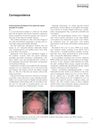 12 citations,
November 2011 in “International Journal of Dermatology”
12 citations,
November 2011 in “International Journal of Dermatology” A woman developed a scalp condition from using minoxidil, which improved with a different treatment but left scarring.
 10 citations,
January 2017 in “Skin appendage disorders”
10 citations,
January 2017 in “Skin appendage disorders” Emotional stress can trigger intermittent hair loss in chronic telogen effluvium, which may not improve with treatment if stress continues.
 9 citations,
July 2017 in “Dermatologic Therapy”
9 citations,
July 2017 in “Dermatologic Therapy” Two elderly men developed scalp inflammation after using a gel for skin lesions, which healed with treatment except for some permanent hair loss.
 7 citations,
September 2015 in “Actas Dermo-Sifiliográficas”
7 citations,
September 2015 in “Actas Dermo-Sifiliográficas” Hair transplantation for Frontal Fibrosing Alopecia may work if done after the disease is inactive for 2 years and with ongoing treatment after surgery.
 3 citations,
August 2022 in “JAAD case reports”
3 citations,
August 2022 in “JAAD case reports” A woman developed swelling in her body after taking low-dose oral minoxidil for hair loss, but it resolved after stopping the medication.
[object Object] 3 citations,
August 2019 in “PubMed” Topical corticosteroid foams are effective, safe, and easy to use for treating various skin conditions.
 2 citations,
January 2009 in “Actas Dermo-Sifiliográficas”
2 citations,
January 2009 in “Actas Dermo-Sifiliográficas” Scalp psoriasis treatments like strong corticosteroids and vitamin D3 analogues are effective, especially when combined.
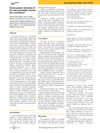 2 citations,
July 2022 in “Dermatology Reports”
2 citations,
July 2022 in “Dermatology Reports” EPDS and MS might share an immune-related cause.
1 citations,
December 2017 in “Annals of Dermatological Research” Accurate early diagnosis of Lichen Planopilaris is crucial to prevent permanent hair loss.
 1 citations,
April 2016 in “Journal of The American Academy of Dermatology”
1 citations,
April 2016 in “Journal of The American Academy of Dermatology” People with allergies or high eosinophil levels have a higher chance of severe hair loss from alopecia areata, and sudden hair loss can indicate chronic graft-versus-host disease.
 1 citations,
October 2015 in “The American journal of gastroenterology”
1 citations,
October 2015 in “The American journal of gastroenterology” Stopping infliximab and using strong topical steroids can regrow hair lost due to psoriasiform alopecia.
 1 citations,
January 2015 in “Springer eBooks”
1 citations,
January 2015 in “Springer eBooks” The document says a skin condition called alopecia areata causes hair loss and stress, and is treated with strong skin creams, injections, or other therapies, but treatment success varies.
January 2022 in “Clinical Cases in Dermatology” A 47-year-old man was diagnosed with a specific type of hair loss and advised to use certain medications and avoid hair transplants.
 April 2019 in “The journal of investigative dermatology/Journal of investigative dermatology”
April 2019 in “The journal of investigative dermatology/Journal of investigative dermatology” High potency topical steroids are the most effective treatment for pediatric alopecia areata.
January 2018 in “Springer eBooks” Alopecia totalis/universalis is a severe form of hair loss where all body hair is lost.






















